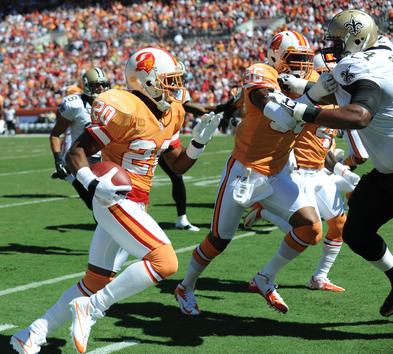|
|
 |
|
Bucs' loss was about more than just the last play
| |
|---|
|
|---|
|
|---|
 Gary Shelton, The St.Petersburg Times, published 22 October 2012
Gary Shelton, The St.Petersburg Times, published 22 October 2012
The Bucs had tied the score with one of their most memorable comebacks. Then they had not. The officials' hands were in the air. Then they were not.
Overtime was about two commercials away. Then it was not.
This is the failure you will remember, that final thrust of a knife to the heart. One minute, Mike Williams was falling to the turf with a tying touchdown catch in his hands, and the next, you were wondering why it did not count. One minute, the Bucs were going places, and the next, they had stepped out of bounds along the way.
Yeah, the Bucs lost on the final play of the game. On the other hand, they did not. This game the Bucs lost about a dozen times in about a dozen ways.
When a team loses a game on the final play on a rarely called rules violation, as the Bucs did in Sunday's 35-28 loss to New Orleans, it can overshadow all the other shortcomings of the afternoon. You can get lost in the language of the rule, and the illogic of it, and it can make you forget about lost opportunities and blown coverages and an invisible pass rush and silly penalties and the rest of it.
At the core of it, however, this defeat wasn't simply about Williams getting shoved out of bounds behind the end zone on the final play. Things are a little more complicated, and a little more vexing, than that.
How did the Bucs lose this game? Start with a first-and-goal situation from one side of your coffee table to the other.
It was halfway through the third quarter, and the Bucs should have been elated. Vincent Jackson had just been tackled after a 95-yard pass reception — and wouldn't 96 have been nice? — and the Bucs had a wonderful opportunity to tie the score at 28. All they needed was 3 feet in four downs. Is that too much to ask?
Turns out, it was. For some reason, the Bucs lined up with LeGarrette Blount as their tailback. In a goal-to-go situation, that has rarely been a good idea. Blount is listed at 247 pounds, but in short yardage situations, he has never run like it.
 Some backs attack the line of scrimmage; Blount seems to feel his way. Granted, Blount is a runaway truck when he breaks into the secondary, but in short yardage, he isn't exactly Larry Csonka. Or, for that matter, Mike Alstott. The pile does not move.
Some backs attack the line of scrimmage; Blount seems to feel his way. Granted, Blount is a runaway truck when he breaks into the secondary, but in short yardage, he isn't exactly Larry Csonka. Or, for that matter, Mike Alstott. The pile does not move.
On first down, Blount lost a yard. On second down, he gained that yard back, but no more. On third down, he didn't gain an inch. On fourth down, Josh Freeman bootlegged to his right, which would have been a lovely call on second down. By fourth down, however, the Saints had figured out what was coming. Blount? Really? Is he the Bucs' best goal-line option?
"Whether he is or he isn't, certainly we think he is," said Greg Schiano. "That's why he's in there at the time. We're doing everything we can to score. You have to constantly evaluate that stuff. Through our evaluations, that's what we believed."
Why? Doesn't anyone in the front office remember Blount running softly toward the wrong hole in Atlanta in 2010? Frankly, can you ever remember Blount crashing through bodies into the end zone? Blount has a lot of skills on the field, but that isn't one of them. Just a thought, but perhaps some extra evaluation is required.
How did the Bucs lose this game? Maybe they lost it with their pass coverage. There were plays when Saints players were open to the point of embarrassment. Put it this way: Every time the Saints ran the ball, Schiano should have sent over a fruit basket, because New Orleans was doing his team a favor.
How did the Bucs lose this game? Because they couldn't muster enough of a pass rush. If every Bucs rusher had shouted Drew Brees' name as he threw the ball, Brees wouldn't have heard a sound. They weren't close enough.
"We've got to do our jobs better," said safety Ronde Barber. "A lot of those plays weren't (Brees); they were us."
How did the Bucs lose the game? How about all the silly penalties? Twice, the Bucs were penalized for lining up wrong (once on a punt and once on a field goal). Isn't that the kind of I'm-smarter-than-you stuff that can backfire on a team?
For Schiano, that's the challenge here. It's easy enough to teach a receiver not to get knocked out of bounds. The rest of the stuff is harder. So go ahead. Talk about the final play. Shout. Swear. Kick the couch.
The other stuff? Remember that, too. It'll get a team beaten long before the final play comes around.
|

|
|
| |
| |
|